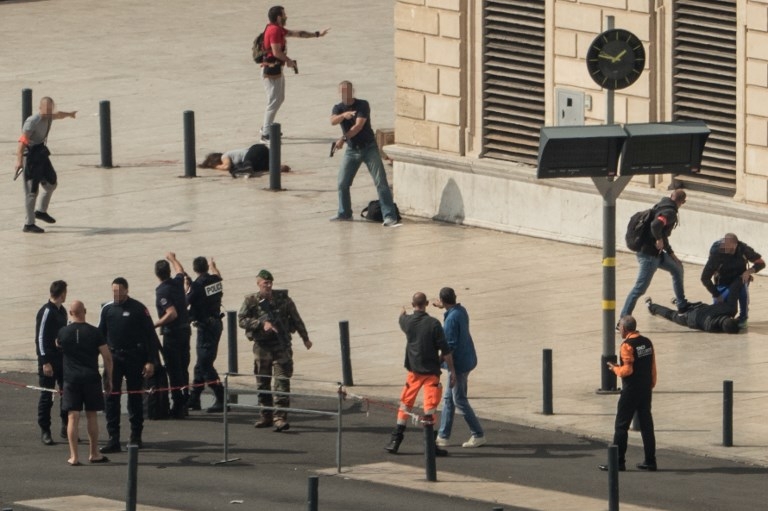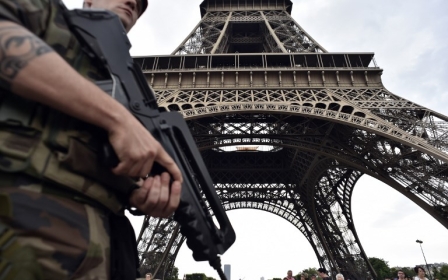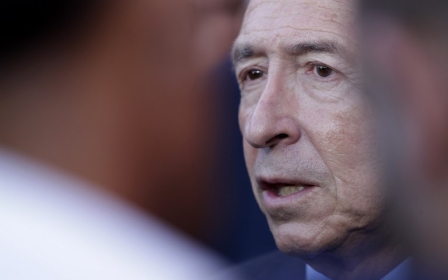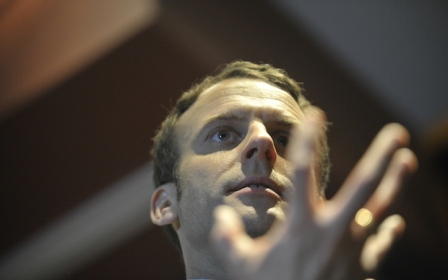Marseille suspect had been released by police just prior to attack: Source

The man suspected of carrying out Sunday's attack in the French city of Marseille, killing two women, had been arrested and then released by police two days before the incident, a source close to the police investigation said.
The source said the suspect - who went by eight different identities or aliases - was stopped by police in Lyon on 29 September on suspicion of robbery. He was then released for a lack of evidence.
The suspect's identity remained unclear, the source added.
"The murderer had eight different aliases. Each time he was stopped, he presented a different identity paper. That's why it's so difficult. At one moment, he says he was born in France, at another he says he was born in Algeria," the source said.
A soldier shot the suspect dead after he had stabbed two women to death at Marseille main train station on Sunday, in an attack claimed by the Islamic State (IS) group.
Police sources said the suspect had shouted "Allahu Akbar" (God is greatest) in Arabic as he attacked the women, aged 17 and 20, at Marseille's main railway station.
Two police sources said one had her throat slit while the other was stabbed in the chest and stomach.
The soldiers who shot the knifeman were part of the Operation Sentinelle force composed of 7,000 troops who guard high-risk areas such as transport hubs, tourist sites and religious buildings.
Numerous small attacks
"We have until now managed to avoid such dramatic incidents [in Marseille]. I think it was a terrorist attack and the individual who was killed seems to have had several identities," Marseille mayor Jean-Claude Gaudin told reporters on Sunday.
The country has suffered several major terror attacks since 2015, including on satirical magazine Charlie Hebdo in January of that year followed by an assault on Paris bars and the Bataclan concert hall by gunmen 10 months later, which killed a total of 130 people. Both of these attacks were claimed by the IS group.
In Nice in July 2016, 86 people were killed when a militant drove a truck into crowds after a fireworks display on Bastille Day.
But there have also been numerous smaller attacks on police officers, soldiers or members of the public since then, sometimes carried out by people with severe psychological problems.
Later on Sunday, IS's Amaq propaganda agency cited a "security source" saying: "The executor of the stabbing operation in the city of Marseille... is from the soldiers of the Islamic State."
About 200 police officers cordoned off the area and all roads were closed to traffic.
"I was on the esplanade just in front of the station," Melanie Petit, an 18-year-old student, told AFP. "I heard someone shout 'Allahu Akbar' and I saw a man who seemed to be dressed all in black."
Another witness told Reuters she saw a man take out a knife from his sleeve and then stab a young girl and then a second woman, shouting what may have been "Allahu Akbar".
'barbaric act'
Speaking in Marseille, Interior Minister Gerard Collomb said the man had initially killed one woman and looked to be running away before returning to attack a second woman and then rush towards soldiers from the Sentinelle force who arrived on the scene quickly and shot him dead.
Two police sources said the attacker had been carrying a butcher's knife, was around 30 years old and of North African appearance. One source said he was known to police for common law crimes, while another said digital analysis of fingerprints had come up with several aliases.
"This could be an act of terrorism, but we cannot confirm it fully at this stage," Collomb told reporters.
After the lunchtime attack, anti-terror prosecutors told AFP they had opened an investigation into "killings linked to a terrorist organisation" and the "attempted killing of a public official".
French troops are part of a US-led coalition fighting IS in Syria and Iraq and the country also has thousands of soldiers in West Africa fighting al Qaeda-linked militants, operations that have made these groups urge their followers to target France.
Security forces have increasingly been targeted by militants in knife attacks. A man wielding a knife attacked a soldier in a Paris metro station on 15 September.
President Emmanuel Macron said on Twitter he was "disgusted by this barbaric act" and praised the calmness and efficiency of security forces.
French lawmakers are due to vote on a much-criticised anti-terrorism law on Tuesday, which would see France come out of its state-of-emergency in November, although some of the powers would be enshrined into law.
The number of military personnel on the ground is also due to be reduced slightly, although the force is being adapted to make it more mobile and its movements less predictable.
"The presence of Sentinelle soldiers, their speed and efficiency ensured that the death count was not bigger," police union official Stephane Battaglia told Reuters.
New MEE newsletter: Jerusalem Dispatch
Sign up to get the latest insights and analysis on Israel-Palestine, alongside Turkey Unpacked and other MEE newsletters
Middle East Eye delivers independent and unrivalled coverage and analysis of the Middle East, North Africa and beyond. To learn more about republishing this content and the associated fees, please fill out this form. More about MEE can be found here.




